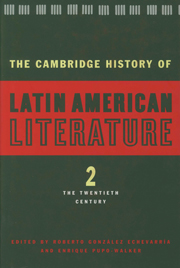Book contents
- Frontmatter
- Introduction to Volume 2
- 1 Modernist poetry
- 2 Modernist prose
- 3 The Vanguardia and its implications
- 4 The literature of Indigenismo
- 5 Afro-Hispanic American literature
- 6 The Criollista novel
- 7 The novel of the Mexican Revolution
- 8 The Spanish American novel from 1950 to 1975
- 9 The Spanish American novel: recent developments, 1975 to 1990
- 10 Spanish American poetry from 1922 to 1975
- 11 The modern essay in Spanish America
- 12 Literary criticism in Spanish America
- 13 The autobiographical narrative
- 14 The twentieth-century short story in Spanish America
- 15 Spanish American theatre in the twentieth century
- 16 Latin American (Hispanic Caribbean) literature written in the United States
- 17 Chicano literature
- Index
- Bibliographies
- References
6 - The Criollista novel
Published online by Cambridge University Press: 28 March 2008
- Frontmatter
- Introduction to Volume 2
- 1 Modernist poetry
- 2 Modernist prose
- 3 The Vanguardia and its implications
- 4 The literature of Indigenismo
- 5 Afro-Hispanic American literature
- 6 The Criollista novel
- 7 The novel of the Mexican Revolution
- 8 The Spanish American novel from 1950 to 1975
- 9 The Spanish American novel: recent developments, 1975 to 1990
- 10 Spanish American poetry from 1922 to 1975
- 11 The modern essay in Spanish America
- 12 Literary criticism in Spanish America
- 13 The autobiographical narrative
- 14 The twentieth-century short story in Spanish America
- 15 Spanish American theatre in the twentieth century
- 16 Latin American (Hispanic Caribbean) literature written in the United States
- 17 Chicano literature
- Index
- Bibliographies
- References
Summary
The historical depth of the preoccupation with indigenous cultural values in Spanish America makes it difficult to undertake the determination of the precise origins of criollista [creole] literary production. During the nation-building stage in the nineteenth century, the leading groups of what would eventually constitute the individual countries of Latin America were busily establishing the discourses and institutions that would preserve an avowed national identity that was, in fact, being created in the process. Hence, one can readily find throughout the century several manifestations of the desire to engender a native literature, from Andrés Bello (1781–1865) through Domingo F. Sarmiento (1811–1888) to José Marti (1853–1895). Indeed the period presents many instances that attest to the conviction that linguistic and literary specificity were regarded as correlatives of the political and cultural distinctiveness that Spanish America had recently achieved through its struggle for independence. One can cite in this regard the many published collections of cubanismos, argentinismos or venezolanismos, the periodic reformist projects to adjust Spanish orthography to Spanish American phonetics – Bello and Sarmiento are well known exponents of this endeavor – and the founding of Academias Nacionales de la Lengua throughout the continent.
Furthermore, although there are essential differences that distinguish the cuadro de costumbres [folkloric sketch] from criollista literary production, it is no less true that in Spanish America the cuadro exhibits a desire for cultural affirmation that differentiates it from its European counterpart and which determines its unusual longevity in the former colonies. It could be argued as well that one of the persistent preoccupations of the practitioners of the late nineteenth-century movement called Modernismo [Modernism], notwithstanding the critical notion that affirms its cosmopolitan thrust, ultimately turned out to be a concern for an indigenous literary expression.
- Type
- Chapter
- Information
- The Cambridge History of Latin American Literature , pp. 195 - 212Publisher: Cambridge University PressPrint publication year: 1996
References
- 1
- Cited by



